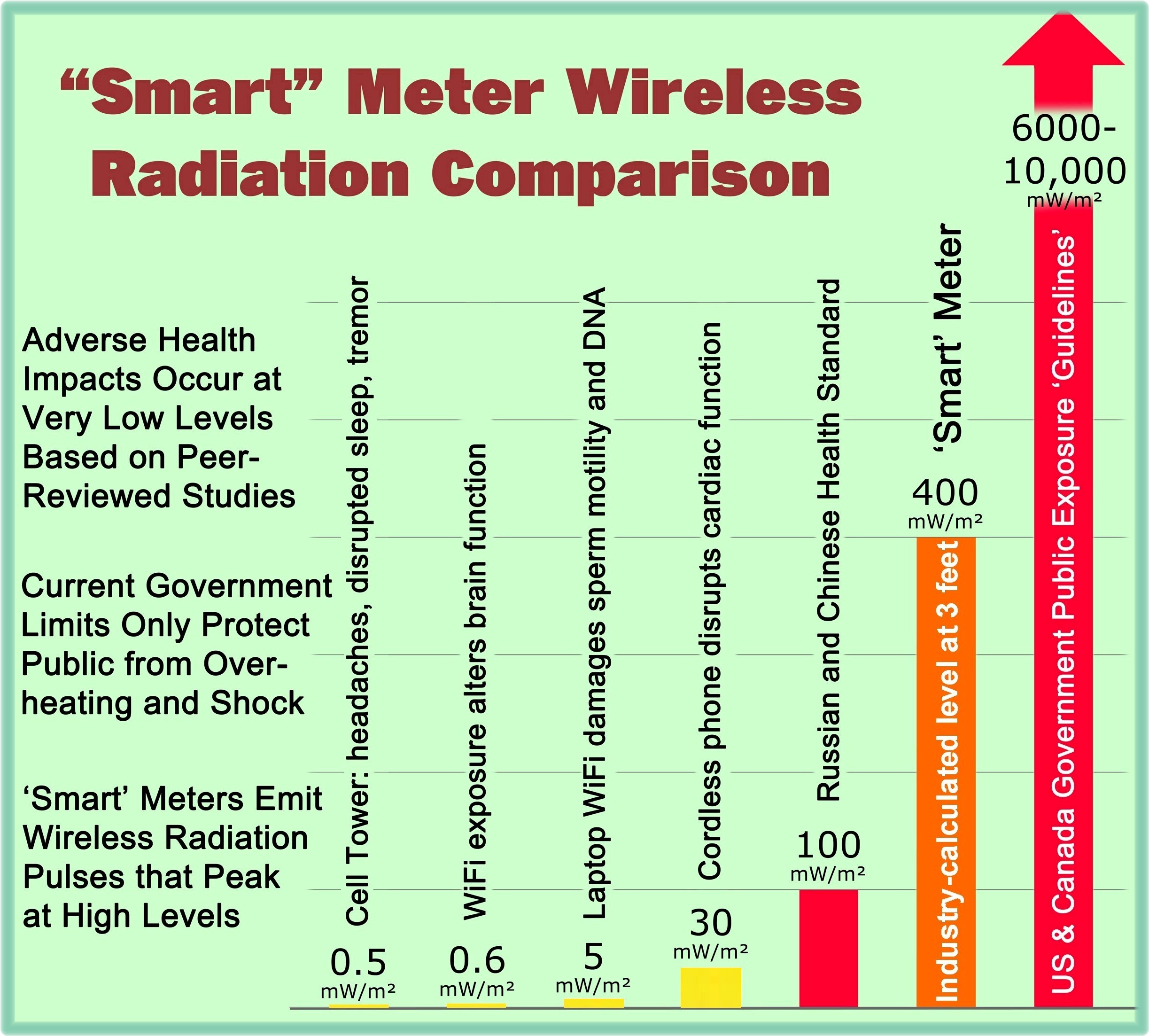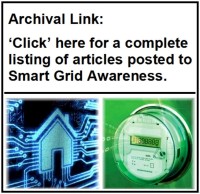 INDIANAPOLIS – State regulators have rejected a proposal from Duke Energy to raise customers’ rates. The Indiana Utility Regulatory Commission said Friday in a ruling that the company didn’t provide enough details for its $1.9 billion, seven-year plan.
INDIANAPOLIS – State regulators have rejected a proposal from Duke Energy to raise customers’ rates. The Indiana Utility Regulatory Commission said Friday in a ruling that the company didn’t provide enough details for its $1.9 billion, seven-year plan.
The proposal would have put Duke Energy’s Indiana customers on smart grid technology and have installed privacy invading digital smart meters in every home, tracking detailed energy consumption and transmitting that data using potentially harmful radiofrequency emissions.
Privacy experts nationwide have also voiced major concerns about where that granular energy usage data goes.
Duke’s plan faced a slew of opposition.
“This was a big win for consumers,” Kerwin Olson said, executive director of the Citizens Action Coalition. “Duke failed to meet their burden of proof. The law clearly spells out criteria that the utility has to get in order to meet this kind of approval. And this is a lot of money.”
Duke Energy says it will eventually re-file a request to install smart grid technology for Indiana customers.
[The above video contains material used pursuant to the Fair Use Doctrine under 17 U.S.C. 107 and is presented in the public’s interest for non-commercial purposes.]
From the Order by the Indiana Utility Regulatory Commission:
“Duke looked at the proposed costs of AMI and compared those costs to quantifiable benefits, such as savings from meter reading. … The main quantifiable benefits arise from the elimination of monthly manual meter reads, enhanced theft detection that can be conducted without a truck roll, and the ability to conduct customer requested service disconnects and reconnects remotely.”
Analysis: Note that the above so-called “quantifiable benefits” are for the utility to eliminate the jobs of meter readers and reduce theft.
“Near-term customer benefits include hourly interval usage data (next day) through a unique website portal, allowing customers to better understand their energy usage and save energy, and the convenience of remote turn off / turn on for customer moves. Future, advanced-metering benefits could include time-differentiated peak pricing rates, pay as you go billing options, pick your own due date options, and customer usage alerts.”
Analysis: What does the soft “benefit” of customers better understanding their energy usage have to do with the utility’s sole obligation to provide “electric utility service,” the plain meaning of which is described in the Indiana commission order as “the infrastructure necessary to transmit electricity from the generation facility to the customer”? … It doesn’t.
The future “benefit” of time-of-use pricing rates would also favor the utility by being able to charge dramatically higher rates during the day. Most consumers are not able to shift meaningful amounts of energy usage to the middle of the night; thus, this future “benefit” is not a benefit at all.
To provide perspective, it seems appropriate at this point to quote the Attorney General for the state of Illinois who made some important common sense observations, as appropriate today as they were in 2011:
“The utilities want to experiment with expensive and unproven smart grid technology, yet all the risk for this experiment will lie with consumers. … The pitch is that smart meters will allow consumers to monitor their electrical usage, helping them to reduce consumption and save money. … Consumers don’t need to be forced to pay billions for so-called smart technology to know how to reduce their utility bills. We know to turn down the heat or air conditioning and shut off the lights.”
Although smart meters involve many risks to consumers and society such as health issues, privacy invasions, cyber threats, fires, etc., just based upon an objective financial analysis alone, they cannot be justified. We applaud the Indiana Utility Regulatory Commission for recognizing this and where it states in its Order:
“In the absence of any sufficient evidence to support Duke’s cost estimates, even for the first-year projects in the T &D Plan, we cannot find that the estimated costs are the best estimate of the costs of the eligible improvements as required by Ind. Code § 8-1-39-10. It is not enough for Duke, or even Black & Veatch, to simply assure us that the costs estimates are reasonable or best estimates. …
IT IS THEREFORE ORDERED BY THE INDIANA UTILITY REGULATORY COMMISSION that:
1. Duke’s request for approval of its T&D Plan is denied for the reasons set forth above.”
It looks like that Duke Energy was saying, “Just trust us” on our cost estimates and that the benefits outweigh the costs. The Indiana commissioners weren’t buying it.
Supplemental Information:
For additional perspective, please see the following post by an Arizona anti-smart meter activist (which was partially written as a follow-up to the article at this website): “Smart” Meters Halted by Regulators in Indiana at http://www.activistpost.com/2015/05/smart-meters-halted-by-regulators-in.html
Primary Source Material for this Article:
“State regulators reject Duke Energy’s request for rate hike,” at http://fox59.com/2015/05/11/state-regulators-reject-duke-energys-request-for-rate-hike/
Updated Information, March 8, 2016:
Utility makes arguments for cycling back to AMI later
Duke Energy Indiana has reached a settlement with some of the state’s consumer groups on the company’s plan to modernize its electric grid.
In May of 2015, the Indiana Utility Regulatory Commission denied Duke Energy Indiana’s original plan proposed in August 2014, asking for more details and more focus on electric grid projects. In December, the company filed a revised plan addressing the commission’s issues.
As part of the settlement, Duke Energy will reduce the level of capital investments recovered through the plan’s customer bill tracker from approximately $1.8 billion to approximately $1.4 billion. Part of the reduction comes from $192 million earmarked for new advanced digital meters, but the company retains the ability to pursue the meters and defer their costs for consideration in a future rate case rather than through a monthly bill tracker as other items in the plan.
The company also agreed to reduce its return on equity on plan investments from 10.5 to 10 percent for investments that flow through the plan’s bill tracker. This does not impact the company’s 10.5 percent allowed return on equity on its other remaining investments.
The proposed settlement will need to be approved by the Indiana Utility Regulatory Commission.





To hell with all smartass meters…freedom does not allow gov spying on what u do in your house
Why can’t people opt out of the NIPSCO meters. They are making people very ill. Nipsco refused to help people who are disabled by the exposures have the meter removed. Many other companies across the U.S. are helping those who are getting ill. Headaches, chest pain, burning skin, shortness of breath and fatigue are some of the documented symptoms related to nonionizing radiatin exposure. Still, they refuse to help those affected with any kind of accommodation. This is an attack on the disabled. Many elderly people and young children are affected too. Check to see if your meter is on a bedreoom wall with your children and get it removed ASAP!! We must not allow a energy company damage us for profit. Where is the Utility Commission for those who are ill??
Pingback: Indiana Regulators Reject Duke Energy Smart Meter Plan | Stop Smart Meters!
Pingback: Indiana Regulators Halt Smart Meters
Pingback: “Smart” Meters Halted by Regulators in Indiana | Living For Longer
Pingback: “Smart” Meters Halted by Regulators in Indiana | Scoop Feed
Pingback: “Smart” Meters Halted by Regulators in Indiana | Sandora News Aggregator Portal
Pingback: “Smart” Meters Halted by Regulators in Indiana | World Liberty News
Congratulations to all of you Indiana Commissioners for knocking back Duke Energy’s SELFISH requests, take a bow. You deserve it. These Electric Microwave so-called A.M.I Smart Meters aren’t SMART in any way as people in Victorian Australia and New Zealand and all countries of the World are fast finding out. All sorts of Human Microwave sicknesses are emanating from these DEVILISH DEVICES from Tinnitus to muscle aches to chronic insomnia to feelings of crawling skin effects to nose bleeds etc.. yes.
And then to the death of honey bees and bumble bees etc. To homes getting burnt down to domestic and small business fridges and deep freezers getting FUSION, which is their electric motors getting burnt out when the fridge gets a large voltage drop and draws too much amperage which burns out the fridges motors. Yes even computers and printers get burnt out as well as you have found.